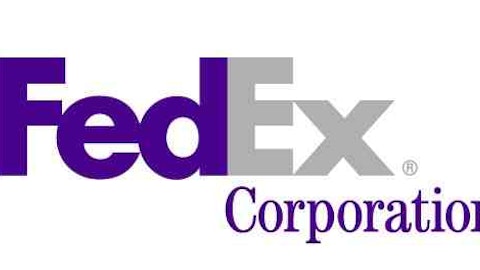In a recent Forbes article, Bill Conerly claims that the price for oil may decline by as much as $20 per barrel. I am not sure if it will happen, but there are several conditions that may push prices lower:
Due to current high oil prices, the total number of rigs has more than doubled since the 1980s. China is showing a steady but continuous slowdown in its economic activity according to contractions in the PMI index. This may trigger a weakening demand for oil and push down prices. Further, the processing of oil sands in Canada may increase the supply of the fossil fuel, which may put pressure on prices. The resolution of the conflicts in the Middle East may also ease concerns regarding supply.
As you can see, there are several issues that could pressure oil prices.
However, this is not all bad news. These companies should benefit from declining oil prices, and they could provide some hedge against oil-related long positions in your portfolio.
Hide out in airlines

According to its most recent quarterly earnings report, the aircraft fuel and related expenses added up to $2.59 billion, significantly down from $3.3 billion for the same quarter a year ago. Even with the 21% reduction, mainly due to the operation of more fuel-efficient aircraft, the fuel expenses accounted for 25% of the total operational expenses.
The decline in oil prices should increase the company’s operating margins, helping the carrier return more value to its investors.
Currently, it pays a modest dividend of $0.24 per share, equivalent to 1.1%. Although it was recently instated, a reduction in its net income may suggest a hike in the interim. On the other hand, Delta Air Lines, Inc. (NYSE:DAL)’s share repurchase program was largely expanded in May to $1.5 billion. Investors should be rewarded handsomely in the near future.
I bet you haven’t thought about this one
Railroad companies may see higher operating revenues. According to CSX Corporation (NYSE:CSX)’s most recent quarterly earnings report, fuel expenses totaled $397 million, totaling almost 20% of the overall expenses of the company.
Since locomotives use large amounts of diesel to operate, declining prices of oil greatly aids CSX Corporation (NYSE:CSX) to capitalize higher net incomes. It is worth noting that CSX used 490 million gallons of fuel in 2010.
On a forward looking basis, the railroad company is allocating large amounts of cash to improve the fuel efficiency of its locomotives. For instance, a locomotive idling reduction technology is being implemented by installing Auxiliary Power Units and Automated Engine Start Stop. This should reduce fuel consumption while idle, and at the same time, it reduces the greenhouse gases emitted into the atmosphere.
On the financial standing, the company managed to increase its revenue by 2% to $3.06 billion on a year-over-year basis. Its net income rose from $512 million, or $0.49 per share, to $535 million, or $0.52 per share.
Another transportation method
FedEx Corporation (NYSE:FDX) is a parcel delivery company with presence worldwide. According to its most recent annual earnings report, fuel expenses accounted for $4.7 billion for fiscal 2013, which is 10.7% of total revenue. The average price for vehicle fuel was $3.81 per gallon, while jet fuel cost $3.22 per gallon.
Therefore, FedEx Corporation (NYSE:FDX) would benefit significantly if oil prices decline. Since some of the fuel surcharges are passed on to the customer, the customer may be prompted to seek cheaper, but slower, shipping alternatives. Therefore, declining oil prices would not only help the company to reduce its fuel expenses, but by offering a cheaper service, its revenue should be higher.
Taking a quick scan of FedEx Corporation (NYSE:FDX)’s aircraft fleet, maybe it is not a bad idea to replace its aircraft. The company operates 89 Boeing B757-200, a model that many airlines are replacing with more fuel-efficient aircraft such as the Airbus A320 or the Boeing B737-700. This should also help the company save on fuel expenses in the long run.
From the fundamental point of view, its balance sheet looks solid. FedEx Corporation (NYSE:FDX) posted an increase in revenue of 4% from 2012 to $44.2 billion for fiscal 2013. However, due to a large investment in transportation, its net income declined from $2.0 billion, or $6.44 per share, to $1.5 billion, or $4.95 per share.
The Foolish conclusion
I want my first rule of investment to be your guideline. There is always a place to invest. Therefore, if oil prices decline, these stocks offer excellent investment prospects because their operations expenses will decline significantly. We have observed that fuel expenses account in some cases for more than 10% of the consolidated revenues in these companies.
Delta Air Lines, Inc. (NYSE:DAL)’ fuel expenses account for 25% of the total expenses. Therefore, a reduction in oil prices should increase the possibility for the company to return value to its investors by hiking the recently initiated dividend payment.
CSX Corporation (NYSE:CSX) also spends a large amount of cash on fuel. Although the company is investing heavily in fuel-efficiency technology, declining oil prices should also bring higher operational margins.
Last, FedEx Corporation (NYSE:FDX)’s fuel expenses account for 10% of its consolidated revenue, a charge that is partially passed on to the customer. Therefore, lower oil prices may propel customers to pay less for shipping parcels, which should bring higher revenues.
For these reasons, I recommend owning these stocks if you observe a decline in oil demand.
The article Where to Invest When Oil Prices Decline? originally appeared on Fool.com and is written by Robinson Roacho.
Robinson Roacho has no position in any stocks mentioned. The Motley Fool recommends FedEx. Robinson is a member of The Motley Fool Blog Network — entries represent the personal opinion of the blogger and are not formally edited.
Copyright © 1995 – 2013 The Motley Fool, LLC. All rights reserved. The Motley Fool has a disclosure policy.



